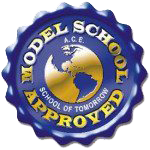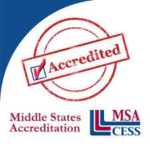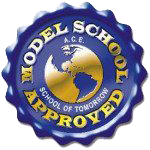Q. Where are your church facilities?
A. We utilize our school buildings for church meetings.
What do I need to bring for my first day of school?
A. Preschool children need a backpack, a water bottle, and a rest mat. School-age children need a backpack, and a water bottle. High school students must provide their own scientific calculator, a compass, and a protractor.
Q. Do children wear uniforms?
A. Preschool children are not required to wear uniforms.
School-age children are required to wear uniforms.
Q. Are Registration Fees and Tuition refundable if I change my mind?
A. Registration Fees are not refundable. Tuition is refundable if you notify us prior to the first day of school.
Q. Do you offer a part-time preschool program?
A. Yes. Our part-time preschool ours are Monday – Thursday, 8:15 AM – 3:45 PM and Friday 8:15 AM – 12:00 Noon.
Q. Do you offer Extended Care?
A. Yes. We offer School-age Extended Care, 6:30 AM-6:00 PM, Monday – Friday.
Q. What does your preschool teach?
A. Our preschool is designed to teach traditional family values. We use a phonics-based learning-to-read system and traditional math. Our teachers use a direct teaching approach to learning and discipline.
Q. When can my child start kindergarten?
A. Usually, children who are 5 years of age by September 1st start kindergarten.
Q. Can I come tour and see the school before applying?
A. Yes
Q. How do I start the enrollment process?
A. Schedule a school tour by calling our office at 512-255-7676.
Q. What is the classroom style for K-12?
A. Our classrooms are designed for multi age groupings of 5-7 (Elementary 1), 8-9 (Elementary 2), 10-12 (Middle School), and 13-18 (Upper School. The teaching style for each grouping is designed to meet the needs of individual learners within that grouping. We utilize individual assessment data to drive curriculum delivery to each student.
Q. Do you have payment plans for tuition?
A. Yes. We offer the following payment plans for school-age students:
12-month Payment Plan begins June 1.
10-month Payment Plan begins August 1.
Q. If I pay my tuition in advance, will I get a discount?
A. Yes. If you pay your fees and tuition by August 1st for the current year term, you will receive a 5% discount on tuition.
Q. If I have more than one child registering, will I receive a discount?
A. Yes. We offer second and third child discounts for children of the same family.
Q. What is the history of the building?
A. Our building was constructed between 1853 and 1864. Additions were made in 1934 and 1971. The historic designation of the site is the Selstrom House.
Q. What can I bring for my child’s birthday? Am I allowed to come and celebrate with them?
A. Cupcakes or cookies. Check with your child’s teacher for the quantity and time of the party.
Q. Can my child order JUST lunch?
A. Yes
Q. How can I buy a food card?
A. Go to the Store at the top of the page.
Q. How can I donate?
A. Click Donate at the top of the page.
Q. Will there be a refrigerator to put my child’s lunch in?
A. No. A cold pack is usually sufficient to keep food fresh all day.
Q. What sports, musical, and extracurricular activities do you offer? Do they cost extra?
A. We have the following extracurricular categories:
- Academics
- Arts
- Photography
- Athletics
- Color Guard/Flag Corps
- Music
- Speech/Drama
Q. How much notice do you require to withdrawal my child from preschool?
A. 30 days
Q. What are PIE Meetings?
A. Partners in Education (PIE) is our parent organization that helps with student activities and fundraising.
Q. Does preschool go on field trips for summer camp?
A. No
Q. My child is 5, can they go on field trips in summer camp?
A. Generally, children need to have graduated Kindergarten in order to go on field trips during the summer.




